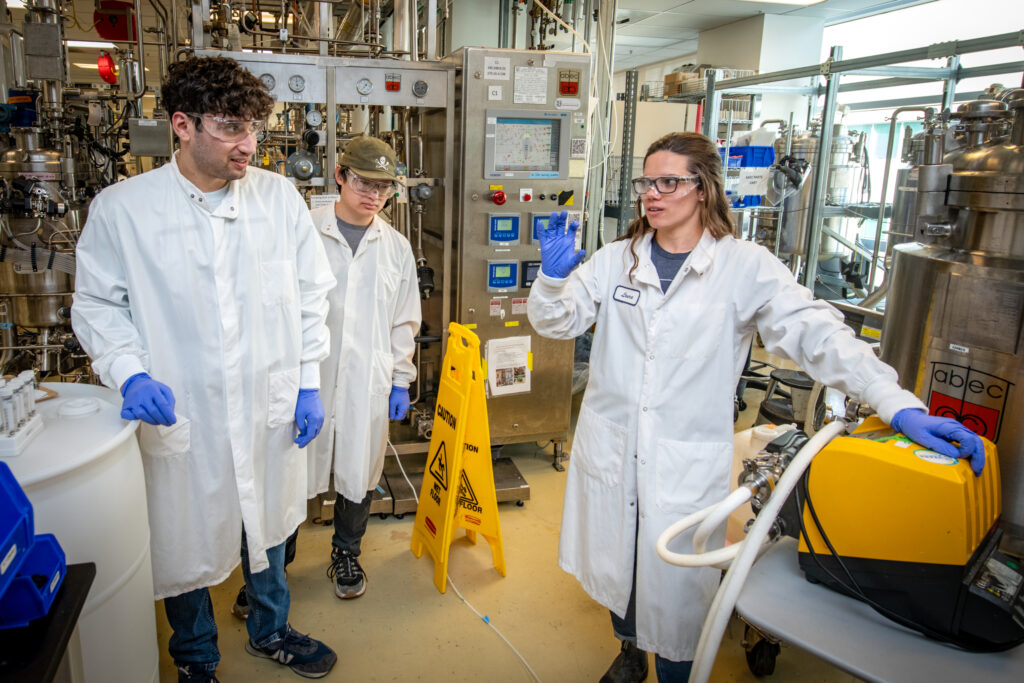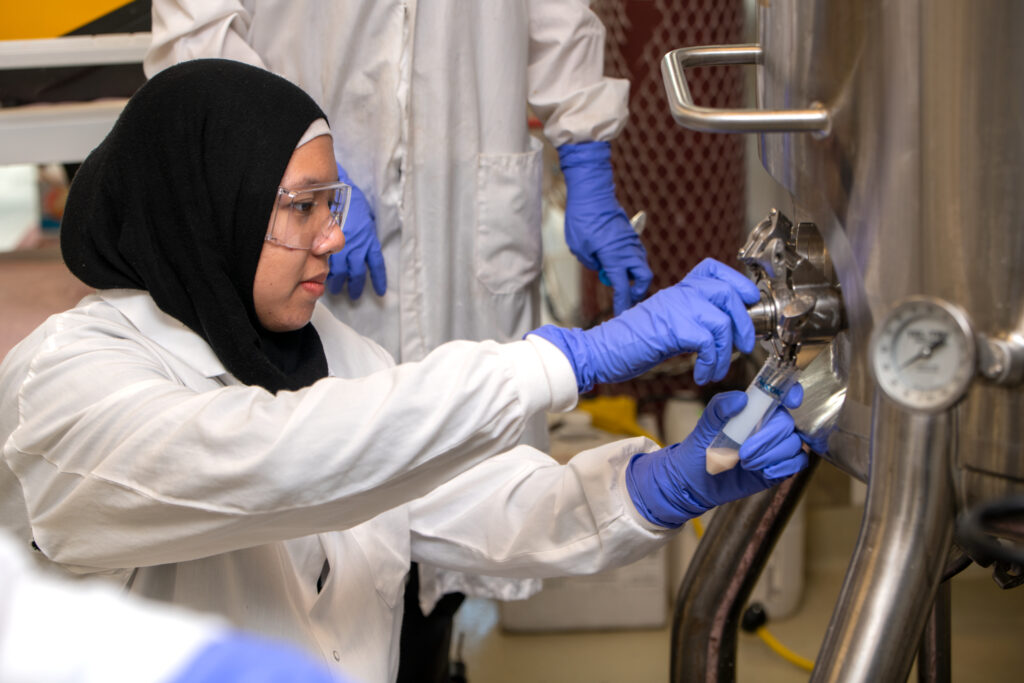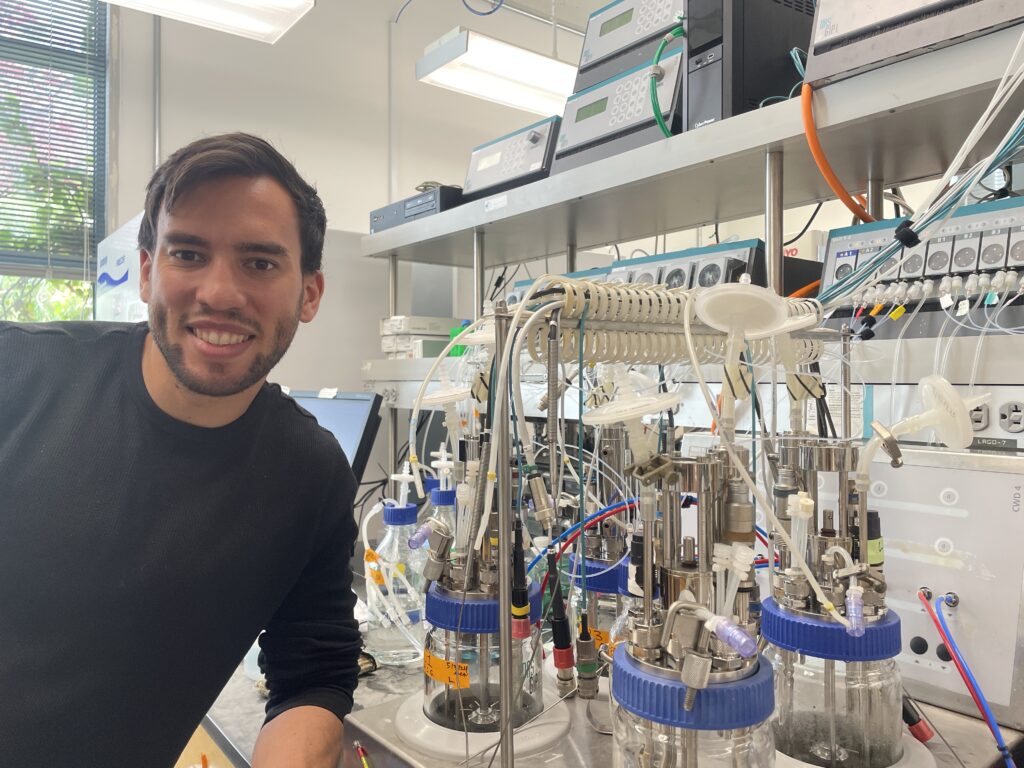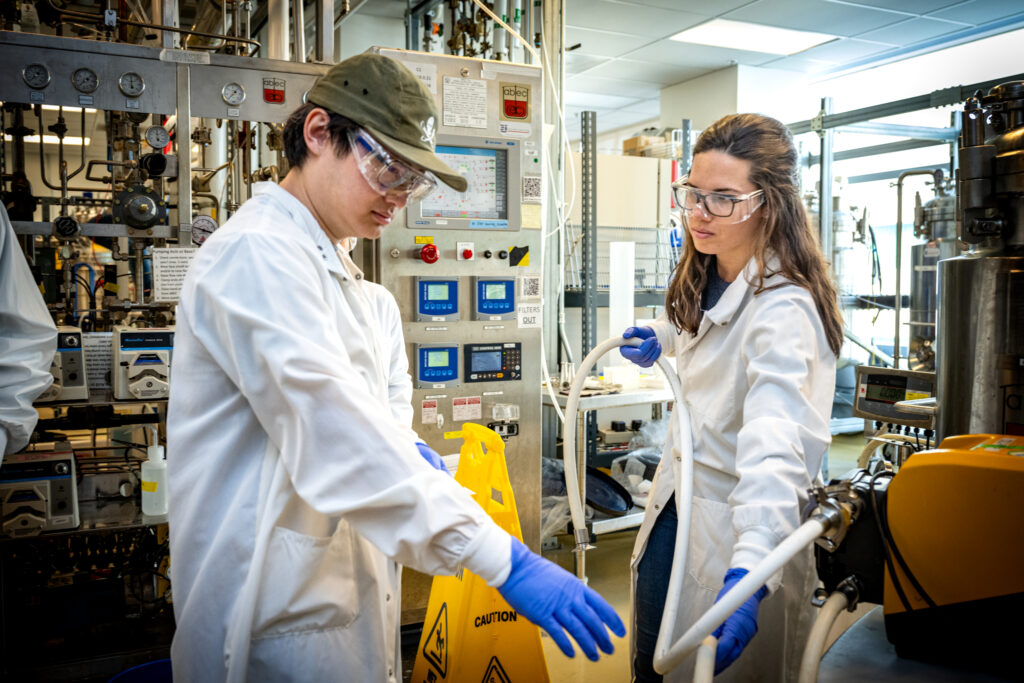As a recent college graduate, Javier Santana was working in the petrochemical industry when he decided to make a career change. Seeking more opportunities for innovation, he turned to biomanufacturing — a growing industry that uses microbes to create sustainable chemicals, fuels, materials, and food products.
Santana was drawn to opportunities for research and development in the nascent biomanufacturing sector compared to his previous experience. A chemical engineer by training, he had one piece of the puzzle. However, he knew he would need additional training in biology and experience working with bioprocessing equipment in order to enter this field. After researching post-grad training options online, he came across the University of California, Berkeley’s Master of Bioprocess Engineering (MBPE) program.
The nine-month program provides students with a comprehensive overview of bioprocess engineering, which uses biology and engineering to develop processes that enable large-scale manufacturing of bio-based products. The program prepares graduates for careers in biomanufacturing, pharmaceuticals, and the food industry.
A key part of the program is the laboratory capstone course that takes place at the Advanced Biofuels and Bioproducts Process Development Unit (ABPDU) at the Lawrence Berkeley National Laboratory. ABPDU is a U.S. Department of Energy (DOE) Bioenergy Technologies Office (BETO) supported facility that helps companies scale up and develop prototypes of bio-based products. The course provides students with valuable hands-on experience with industry-relevant bioprocessing equipment at ABPDU. It was this aspect of the program that made Santana decide to apply.
“The selling factor for me was the partnership between MBPE and ABPDU,” Santana said of the unique opportunity to work at the ABPDU. “The fact that I would get the opportunity to train on real equipment and have direct exposure to what’s used in industry seemed like a great plus.”
Less than a year after entering the MBPE program, Santana is now a process development engineer at Izote Biosciences and is one of 45 graduates of the program to date. Other graduates have gone on to work at companies such as LanzaTech, Pfizer, and a variety of biotech startups.
For Jason Ryder, director of the MBPE program, this type of curriculum is a significant step toward growing the workforce needed to meet the demands of the bioeconomy, the burgeoning sector of the global economy based on biomanufacturing. With over 20 years of experience in the biotechnology industry, and as the founder and Chief Technology Officer of Oobli, Ryder has seen firsthand the demand for trained scientists and engineers that can develop and scale up sustainable technologies and products.
“Since I entered this field, the technology has improved, but we haven’t been able to build the workforce,” Ryder said. “We’ve seen the impact with the students in this program and the roles they’re taking, and we’re off to a great start.”
An interactive experience
Since its inception in 2021, the Advanced Bioprocess Engineering Laboratory capstone course at ABPDU has undergone continuous refinement. Its instructors, ABPDU senior process engineers Asun Oka and Laura Fernandez, have incorporated feedback from students and added new course content. “Each cohort becomes easier, and we get more familiar with how to best teach the course,” Oka said. The task of teaching bioprocessing concepts and practices has been an enriching experience for Oka and Fernandez.

“It’s been really cool to see the students’ enthusiasm,” Fernandez said. “The hands-on aspect of the course definitely makes it more engaging — for us instructors as well. I’ve had to learn more about equipment too so I can better explain it to the students. In that way, it’s benefitted me professionally.”
Throughout the course, students attend lectures that provide the theoretical and safety background needed to operate equipment used in every step of a bioprocess, from fermentation to purification. Videos of standard operating procedures (SOPs) developed by ABPDU staff also provide students with detailed equipment tutorials.
Students are also given the rare opportunity to interact and network with representatives of the equipment manufacturers who attend the lectures and are available to the students as a resource. In response to student feedback, Fernandez and Asun have added extra sessions where industry representatives can speak on topics not covered in class.
“We’d get to ask them questions, which helped us learn conceptually how this equipment worked before going out into the lab and working with it ourselves,” said program graduate Javier Santana. “The balance of both theory and experimentation was really great. You need that background, but there are some things you can’t learn from a lecture.”
Once in the lab, students run pilot-scale bioprocess experiments with the equipment they’ve studied. “The instructors did an excellent job guiding us through those sessions and answering all of our questions,” Santana said. “I felt they had a genuine desire to share their knowledge. They were really invested in our success.” Fernandez says she sees students become more confident in the path they’re going to take after graduation. “Someone who’s really interested in going into a specific field often walks out wanting to continue down that path, knowing that they enjoy operating equipment that’s used in that field,” she said.

Graduates of the program qualify and are often hired for Associate Scientist or Process Engineer positions — roles that provide them with opportunities for growth. As someone who works with industry on a daily basis, Oka is encouraged by the program’s results. “It’s a sign that the bioeconomy is not stagnant — it’s growing,” he said. “There is a lot of promise, not only in the technology, but also in the students that are going to go out there and do this work.”
Building the future bioeconomy
In his current role at Izote Biosciences, a startup working on making industrial fermentation more scalable, Santana is getting to do something he says he wouldn’t have been able to do in his previous career trajectory — build something from the ground up. He believes the program and the laboratory course helped him be able to work in this environment.

“If I hadn’t had that experience before starting my current job, it would have taken me a lot longer to get up to speed,” he said. “I learned a lot of the language to be able to ask the right questions.”
The bioeconomy will require more graduates like Santana in order to meet the Biden Administration’s ambitious biomanufacturing goals, such as using biomanufacturing to produce 30% of the nation’s chemicals in the next 20 years. Training and education opportunities are cited as key aspects of this effort.
Ryder sees the MBPE program as the blueprint for future workforce development efforts that will be necessary to fuel the bioeconomy.
“We’ve created a great model for how we can do this,” he said. “We’ve learned that we need to work at the right timescales to train our students. It takes time for students to meaningfully translate their bioprocess fundamentals into applications through their hands and ultimately master these unit operations. We’ll hopefully provide a template for other facilities in the nation to do the same.”
“One of ABPDU’s most important contributions to the community is workforce development,” said Deepti Tanjore, director of the ABPDU. “Several of our employees go on to take leadership positions in industry and academia. However, employee training is not a scalable model for workforce development. We are very glad to be able to partner with UC Berkeley and generate a lab course where we train future engineers not only on critical equipment but also share tacit knowledge essential to their success.”
This post originally appeared on the U.S. Department of Energy’s Bioenergy Technologies Office (BETO) website. The ABPDU is supported by BETO.
